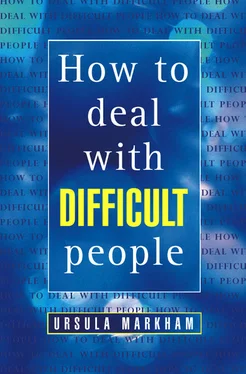Ursula Markham - How to Deal With Difficult People
Здесь есть возможность читать онлайн «Ursula Markham - How to Deal With Difficult People» — ознакомительный отрывок электронной книги совершенно бесплатно, а после прочтения отрывка купить полную версию. В некоторых случаях можно слушать аудио, скачать через торрент в формате fb2 и присутствует краткое содержание. ISBN: , Жанр: unrecognised, на английском языке. Описание произведения, (предисловие) а так же отзывы посетителей доступны на портале библиотеки ЛибКат.
- Название:How to Deal With Difficult People
- Автор:
- Жанр:
- Год:неизвестен
- ISBN:978-0-00-738171-5
- Рейтинг книги:4 / 5. Голосов: 1
-
Избранное:Добавить в избранное
- Отзывы:
-
Ваша оценка:
- 80
- 1
- 2
- 3
- 4
- 5
How to Deal With Difficult People: краткое содержание, описание и аннотация
Предлагаем к чтению аннотацию, описание, краткое содержание или предисловие (зависит от того, что написал сам автор книги «How to Deal With Difficult People»). Если вы не нашли необходимую информацию о книге — напишите в комментариях, мы постараемся отыскать её.
A concise, straightforward book on how to handle difficult people in your personal or professional life.
How to Deal With Difficult People — читать онлайн ознакомительный отрывок
Ниже представлен текст книги, разбитый по страницам. Система сохранения места последней прочитанной страницы, позволяет с удобством читать онлайн бесплатно книгу «How to Deal With Difficult People», без необходимости каждый раз заново искать на чём Вы остановились. Поставьте закладку, и сможете в любой момент перейти на страницу, на которой закончили чтение.
Интервал:
Закладка:
Of one thing you can be confident: understanding what makes difficult people tick and learning how best to handle them will reduce your stress and make your life a great deal easier.
All things are difficult before they are easy
Thomas Fuller, Gnomologia no. 560
CHAPTER ONE Understanding Yourself and Others
There is no way you can make difficult people change and suddenly become sweet and amenable. Such change can only take place when the individuals concerned desire it and work towards it. So, if you can’t change them , the only thing to do is to change your own reaction to them. After all, you are the one who gets hurt and upset while they themselves simply blunder on in their own way.
All communication consists of reaction and counter-reaction. So, by changing your reactions – both inwardly and on the surface – you will in fact make these difficult people counter-react differently (even if only temporarily). Even if this does not help you to eliminate completely any problems that arise, it will diffuse most situations and therefore make them far easier to deal with.
Sometimes you will have to be quite skilful in the way you handle difficult people. While you can let yourself go and shout at a brother or sister, you are likely to get into trouble if you react in the same way to your boss. Even with members of your family, however, shouting is not a very good way to handle trying situations – but at least you won’t lose your job!
Each of us reacts in a different way to such awkward people because each of us has a different starting point. No two individuals have the same view of themselves; one may be calm and composed, another over-confident, while a third may have very low self-esteem. It is so easy to be hurt, deflated and demoralized by the words and actions of others; indeed, this is what they rely on and what gives them their power. But if you allow them to get to you, all you are doing is letting them win – and that is not good for you nor for their next unfortunate victim. The way to overcome the difficulties that arise is to be more clever than they are and to influence their responses – and often you can do this without them even realizing what you are doing.
How Do You React?
Perhaps it would be a good idea to look first at your own reactions to people. The instinctive retort, while often an understandable reaction is not always the best one from any point of view. Difficult people are so used to employing a particular set of tactics that you are likely to fall right into their trap and enable them to play their final trump card. As far as you are concerned, you are likely to end up feeling angry, frustrated and disappointed in yourself. Better by far to take time to think before you react – and better still if you have worked out your strategy in advance.
If you know that you are dealing with someone who is always difficult and who treats everyone in the same way, do try not to take personally the way he speaks to you. It is not really you who is being attacked; this person’s attitude would be the same whoever was at the receiving end. This does not excuse the behaviour in any way – but it might help to reduce your own feelings of inadequacy.
Ask yourself what sort of reaction you have to a difficult person you know. Do you respond extremely negatively? If so, for what reason? Stop and think rationally of what your course of action should be. Simply blowing up and having a fierce verbal battle achieves nothing; all it does is bring you down to the level of the person causing all the difficulties.
You can choose how to react and respond to people. Working through this book will help you understand the choices available to you and to decide which one is best and most appropriate in a particular case. You will be able to build on your inherent strengths (and hopefully minimize your weaknesses) so that you do not allow yourself to be triggered into a response that gets you nowhere and leaves you feeling drained and disappointed in yourself.
All this does not mean that you have to become a ‘yes-person’ or to give in to those who are trying to influence the way you behave. It does not even mean that you are not allowed to be angry. Of course you are. Anger is a natural and often justified emotion and there is nothing wrong in feeling it; what’s important is how you deal with it and express it. There is a world of difference between flying into a screaming rage and telling the other person (in a calm, controlled manner) ‘I feel angry about that.’ The latter is the assertive way and is far more effective as your listener is more likely to take notice. If you scream and shout, he will simply scream back and in the end neither of you will take any notice of what the other is saying.
To throw some light on how difficult people make you react as you do, try asking yourself the following questions:
Do You Really Want to Be Controlled by Others?
All too often that is what is happening – and the only one to suffer is you. The difficult person will carry on, happily convinced that he has won once again.
Picture this scene: Tom is driving steadily along the main road out of town when another vehicle overtakes him on the approach to a bend and, because of oncoming traffic, is forced to cut in immediately in front of him. Tom, who has naturally had a shock, is furious. He goes scarlet with rage, bangs his steering wheel with his fist and calls the other driver every bad name he can think of. The rest of his journey is ruined because he is fuming about what happened – and what could have happened. His concentration lapses and his own driving suffers as a consequence. This makes other people sound their horns at him, which does nothing at all to improve his humour.
No one is saying that Tom was not right to be angry. He did nothing wrong; the fault was entirely the other driver’s. And, had he not managed to cut in front of Tom’s car when he did, the situation could have been even worse due to the stream of oncoming traffic. But who was the one to suffer for Tom’s reaction? Not the other driver – who probably went on overtaking every vehicle ahead of him and was probably completely oblivious of Tom and his feelings.
No, the one to suffer was Tom. It was Tom whose blood-pressure went through the roof; Tom who was left shaking with fury; Tom who became so agitated that his own driving became far less steady and who could have, therefore, caused an accident himself. He had allowed himself and his judgement to be affected by the stupid actions of someone else – and he had not even had the satisfaction of telling that other person how he felt.
In just the same way, if you allow yourself to be goaded into a stressed and extreme reaction by the manipulative behaviour of other people, the only one you are going to harm is yourself. And not only will you fail to get the response you desire but you will be left feeling exhausted by your emotions and disappointed in your own behaviour.
What Is Your Reaction When Confronted by Someone Who Is Furious with You?
Do you match anger with anger? Do you become defensive and make excuses – to which the other person does not listen? Or do you back off and slink away? Each of these reactions is a negative one, whether your anger is justified or not. You are also likely to be left feeling annoyed, not only with the other person but with yourself for acting in the way you have.
Do You Talk Yourself into a State of Negativity?
You know the sort of thing: ‘I’m dreading that interview – I always make a fool of myself’ or ‘I really hate Mondays.’ If an interview is approaching, all you can do is prepare yourself as best you can and try to be as calm as possible on the day. As for Mondays – there was one last week and there’s going to be one next week as well, so you might as well get used to them.
Читать дальшеИнтервал:
Закладка:
Похожие книги на «How to Deal With Difficult People»
Представляем Вашему вниманию похожие книги на «How to Deal With Difficult People» списком для выбора. Мы отобрали схожую по названию и смыслу литературу в надежде предоставить читателям больше вариантов отыскать новые, интересные, ещё непрочитанные произведения.
Обсуждение, отзывы о книге «How to Deal With Difficult People» и просто собственные мнения читателей. Оставьте ваши комментарии, напишите, что Вы думаете о произведении, его смысле или главных героях. Укажите что конкретно понравилось, а что нет, и почему Вы так считаете.












